Earlier this month, India’s Defense Ministry canceled a $500 million deal to buy Spike anti-tank guided missiles from Israeli defense contractor Rafael. According to reporting by Bloomberg, the decision was made in order to give an Indian state-run company “an opportunity to design, develop and manufacture its own anti-tank missile.” The cancellation adds to India’s long-standing reputation for having an unreliable and inefficient defense procurement process. In an email interview, Saurav Jha, an author and commentator on energy and security affairs and founder of Delhi Defence Review, explains what is wrong with the process, the reforms India has implemented and what still needs to be done.
WPR: India’s defense procurement process has been notoriously problematic over the years. What are some of the major problems, and what impact have they had on India and its relations with major arms-supplying partners?
Saurav Jha: The process has always been rather tardy from the perspective of both domestic and foreign suppliers. For starters, there are a total of 11 steps involved in the procurement of any system, which requires review from not just multiple departments within India’s Ministry of Defense, but also the Ministry of Finance for major projects.

